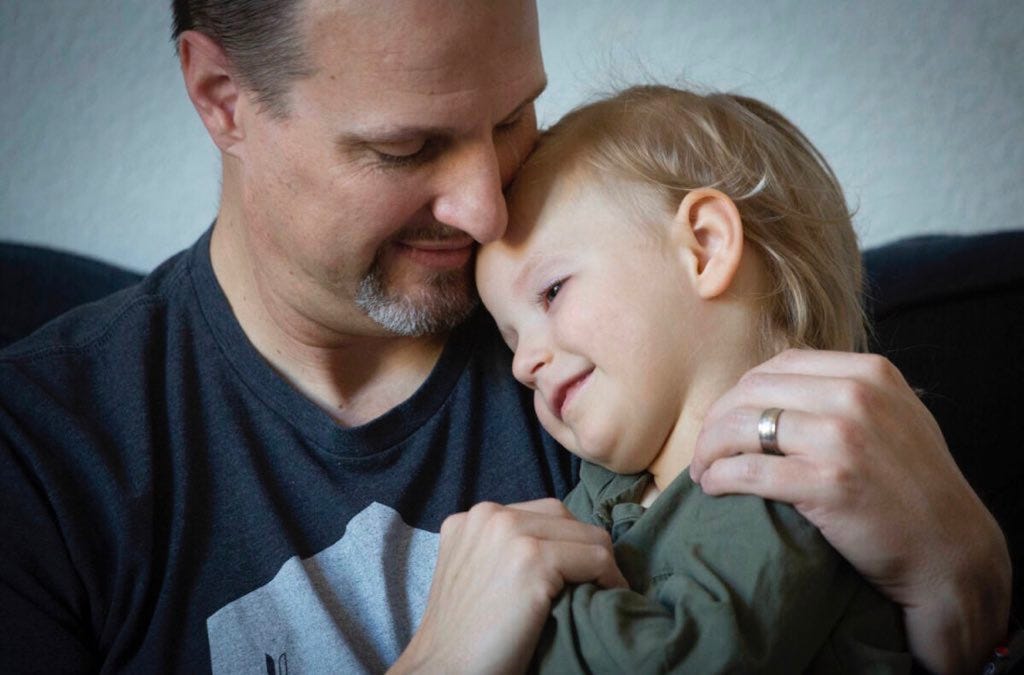The New Fatherhood explores the existential questions facing modern fathers. Here's a bit more information if you're new here. You are one of the 2,574 dads (and curious non-dads) who have already signed up. If you've been forwarded this by someone else, get your own.
This week I'm handing the reins over to Lyle McKeany. Lyle’s newsletter covers "the struggles of being a father to a daughter with cerebral palsy, and the messy life we all deal with every day." I’ve found his writing an open, honest, and insightful view on the highs and lows of fatherhood.
You’d think with at least nine months of preparation, I would’ve been more prepared. Yet, despite plenty of time, I felt like an imposter, one not worthy of the title of father.
I wouldn’t say I was wholly unprepared—I did read the book The Expectant Father from cover to cover. Except reading a book, even if read intently and with purpose, does not necessarily make one prepared. So, you could say, I was well-read on the subject of fatherhood, and I even had the benefit of having been raised by a father deserving of the moniker, and yet I felt woefully not ready. Unprepared, in fact.
Once you become a father, there’s this assumption in your mind that you’ll magically step into the role of a capital F, Father. As if millions of years of evolution will have equipped you for the very moment when you go from father-to-be to father, and suddenly you unlock some secret evolutionary code tucked into the recesses of your mind.
But it doesn’t work that way.
Instead, you realize that all first-time fathers are winging it, to some degree, and this realization of mutual unpreparedness gives you some measure of comfort.
You could make the case that my years as a stepfather should’ve prepared me for fatherhood. But, at four years old, Sara was already fully potty trained and speaking eloquently when I first met her. In those first few years with her, I was mostly a human jungle gym and an extra on the set of her daily productions of “school” or “princess”.
Early on, I had hopes of being like a father to her—as unprepared as I was to assume that role—but her actual father was still in the picture and an important part of her life. There was also no appreciable change in our relationship when I married her mom, which, presumably, is when I officially became Sara’s stepfather. Not long after the wedding, Sara called me stepdad out loud and I wasn’t even prepared to hear that.
Maybe that’s the takeaway. Trying to be prepared for fatherhood, or for most anything else, is like being a meteorologist: you can use your education and tools to predict the weather all you want, but sometimes you’re going to end up in the rain without an umbrella.
But what if you find yourself in an unexpected hurricane? What if when your daughter is born she needs to be resuscitated and it causes a lifelong disability? In that case, your hypothetical umbrella is severely inadequate, rendering any preparation you might’ve done useless anyway.
As you imagine yourself in this impossible situation, you might find yourself asking, “Does this mean preparing is a futile exercise?” Preparation is unavoidable, to an extent. As nice as it sounds to constantly live in the moment, it’s next to impossible to waltz through life without preparing for anything. It’s natural for us to attempt to control our seemingly uncontrollable world as much as we can. Yet we can’t predict everything. The world is too chaotic and random.
So what are we to do when an unexpected storm hits?
Reduce the scope of your window of preparedness. When disaster strikes, focusing on core needs for yourself and those you care about is the best course of action. It’s also often the only—and most instinctual—course of action. In these situations, the present moment is more important than what comes next.
Now, this might sound counterproductive. Shouldn’t you prepare for the future and account for things that might go wrong? Yes. And no. Which is to say, it depends. Let me explain by way of my own story.
Before my daughter Em was born, I imagined the scene in the delivery room: holding my wife Allison’s hand while the doctor coached her through the birth, the nurses placing Em into Allison’s arms, and embracing them both as we began a new chapter in our lives together.
But that’s not what happened. I couldn’t see the storm that was brewing on the horizon.
I was packing the car to head to the hospital when Allison’s water broke in our bedroom. Instead of a calm drive to the hospital, I attempted to not speed too much while I comforted her. When we arrived, two nurses rushed her up to the birthing center in a wheelchair. The doctor assumed his position, ready to help Allison bring Em into the world, but he didn’t have to do much coaching. Twelve minutes after our arrival and three short pushes later, my new baby daughter was born.
There was a problem, though. Em wasn’t breathing. She was rushed to an isolette in the corner of the room and given CPR. As a result, she developed cerebral palsy due to the lack of blood and oxygen in her brain during the first minutes of her life.
Her first week of life was intense. She had to be resuscitated again on two different occasions, her body was repeatedly poked and taped and covered in a mess of wires and tubes, and she never cried like a typical baby would.
The hurricane of extreme and unpredictable events was relentless.
We spent a total of four weeks in the hospital. I barely communicated with work. I didn’t step foot in our house until the day we brought Em home. And I slept on uncomfortable vinyl chairs and beds that were too short for my six-foot one-inch tall body.
Despite the magnitude of the trauma during that month, I’ve never felt so present in my life. It didn’t matter what was going on in the rest of the world. I didn’t care. For those four weeks, nothing was more important to me than being there for Em and Allison. Our motto was to take things minute by minute, which eventually expanded to hour by hour, then relaxed to day by day toward the end of our stay.
I wish I could say these varying levels of intensity ceased after we came home. No, we’ve often had to resort back to taking things minute by minute. Em has struggled with daily vomiting and later—after surgery to tighten her esophagus—retching multiple times per day, uncontrollable body twisting, and her feeding tube coming out in the Las Vegas airport. She still has difficulty holding her own head up consistently, she can’t crawl or walk, and she still gets nearly 100% of her food via tube.
We did have this bit of good news on the eating front this week, though:

While my experience is unique, most parents can relate to the feeling of varying levels of intensity.
Instead of watching nurses fail to place an IV in your newborn’s veins over and over, you’re sleep-deprived and trying to figure out why your baby is screaming at one o’clock in the morning. Instead of watching your daughter fight her constantly moving body to get to sleep, you’re dealing with a son who’s starving and won’t eat anything you put in front of him.
In these moments, it can feel like there’s no end to the harsh winds and rain of the hurricane, and you have no clue what you’re doing or how you’re going to weather the storm. As parents, we do what we always do: we tune out everything else and we give our whole selves to helping our child. Because parenting is the most important job we’ll ever have, whether we’re prepared for it or not.
3 things to read this week
A list of excellent podcasts for parents and their kids from the NYT, including the fantastically named "BUT WHY?" which feels like my life with a 2 year old. If podcasts are your thing, and you're interested in hearing what I sound like, check out this chat I had with Neville Mehra of Never Normal. We covered how the concept of scarcity changes as you get older, choosing where to live as a parent, the ongoing debate around screen time, and why Bandit Heeler is raising the bar for dads. I can't seem to shut up about Bluey lately.
1 in 3 of us will be diagnosed with cancer at some point during our life. There’s a chance you'll be talking to your children about it one day, if you haven’t already. So thank you to Caitlin Flanagan for her essay on how to tell children the truth about cancer, and what she learned from talking to her 5 year old boys about it. I feel more prepared having read it, whilst hoping to never need the advice: "Like many people, I thought that it was possible to control what children know by telling them only what you want them to understand. But children know everything. They may not accurately understand the facts, but they take in all the pieces of what is going on at home and make some meaning out of them."
Clive Thompson's original essay on "rewilding your attention" inspired my own take on it last month, so I was elated to see his action-oriented follow-up with 9 ways on how to do it including weird search engines, asking people questions, and RSS feeds. Pouring one out for Google Reader, always and forever.
Good Dadvice


Say Hello
How did you like this week’s issue? Your feedback helps me make this great.
Loved | Great | OK | Meh | Bad
Follow The New Fatherhood on Twitter and Instagram. Send me links, comments, questions, and feedback. Or just reply to this email.
Branding by Selman Design. Illustrations by Tony Johnson. Thanks also to Lyle for this week’s essay. Subscribe to support The New Fatherhood and join a community of like-minded fathers helping each other become the best dads we can be. Money should never be a barrier to becoming a better parent. So if you want a subscription, but truly can't afford it, reply to this email and I will give you one, no questions asked. If you’d like to underwrite one of those subscriptions, you can donate one here.











Thank you for sharing your story. As a mum of two toddlers, I cannot imagine what you are going through. Parenting indeed is the most important job we will have.
God bless you and your family, Lyle. Thank you for sharing, and yes, while I cannot pretend to know what your experience of fatherhood is like, your larger takeaways are highly relatable. Parenting, like relationships, is kinda like all of my iPhone software updates. The minute I’m comfortable (prepared) and feel like I know what I’m doing, something unexpected comes along and I feel as though I have taken some massive steps backwards.